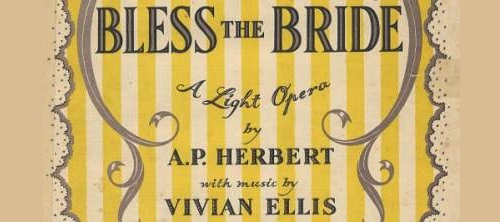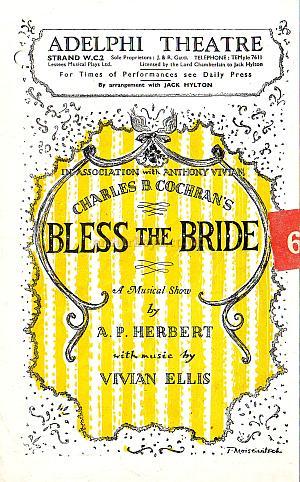
The story was set in the 1870s and told of a young girl named Lucy Veracity Willow who was about to be married to a staid young man, Hon Thomas Trout. She leaves him at the church and elopes with a debonair Frenchman, Pierre Fontaine. The couple travel to France, and are separated due to the effect of the Franco-Prussian War. Finally they find each other and return to England to marry.
Act I
In Victorian England, it is 1870, the eve of the Franco-Prussian War, and a young woman, Lucy Veracity Willow, is having second thoughts about her imminent marriage to the Hon. Thomas Trout. He will not join her in her favourite game of croquet, preferring the "shocking" new game of lawn tennis ("Croquet, Croquet" / "What Will Mother Say"). Worse, he makes good-natured but pointed fun of her principles, especially her attachment to the truth ("Too Good to Be True"). She is resigned to her duty to marry the man approved by her parents, but bemoans the lack of love in their relationship ("Any Man but Thomas T."). Thomas introduces Lucy to a couple of new French friends of his, the debonair and romantic Pierre Fontaine, an actor, and his companion Suzanne, who is also on the stage. Lucy and Pierre quickly fall in love ("I Was Never Kissed Before"), much to Suzanne's chagrin, and they elope to France together in the middle of the elaborate preparations for Lucy and Thomas' wedding ("Bless the Bride").
Act II
In France, Pierre and Lucy are with Suzanne, who seems to be overcoming her initial jealousy of Lucy and is acting as chaperone until the couple can be married ("Mon Pauvre Petit Pierre"). The three take a table in a beachside restaurant ("A Table for Two" / "This Is My Lovely Day"). Into the restaurant crash Lucy's father, mother, cousin George, and the jilted Thomas, who is determined to fight a duel with Pierre if they can find him ("The Englishman"). They have come to "rescue" Lucy, and to this end have adopted disguises (including heavy beards). Their efforts to pass themselves off as French arouse suspicions, and Lucy and Suzanne have to step in to vouch for the party, saving them from arrest as Prussian spies. Lucy declares her love for Pierre to her family, and Thomas confronts Pierre. Dramatic news arrives of the declaration of the Franco-Prussian War. Pierre is a reserve officer and must leave at once to join his regiment. Suzanne and the exultant French crowd leave with him ("To France") - while poor Lucy must return to England with her family.
A year passes, and it is Lucy's twenty first birthday ("Here's a Kiss"). A message has arrived from Suzanne telling her that Pierre was killed in the disastrous war. A chastened Thomas renews his suit for Lucy's hand. She tells him that she cannot forget Pierre but will marry him if he does not rush to the wedding. Suzanne shows up, interrupting the birthday party. She admits that, resentful of the English, she had cruelly lied about Pierre, who is alive and here! Lucy is ecstatic, but Pierre is concerned when he sees Thomas's ring. However, Thomas nobly removes it and hands it to Pierre ("My Big Moment"), and the two lovers can at last marry with everyone's approval ("This Is My Lovely Day" (reprise)).
Bless the Bride had a friendly reception from critics and public when it opened at the Adelphi Theatre in April 1947, a few nights before Oklahoma!, and stayed for 886 performances. London took its stars, Lizbeth Webb (who had previously taken over a lead in Vivian Ellis and A. P. Herbert's Big Ben) and the handsome Greek Georges Guetary to its heart. Herbert's witty libretto followed the fortunes of Lucy Willow (Webb), engaged to but not in love with Thomas Trout (Brian Reece, who would also appear in their Tough at the Top). When she falls in love with a French actor, Pierre Fontaine, she follows him to France but returns to England when he goes to war. Believing him dead, she agrees again to marry Thomas, but Pierre returns and they are reunited. Herbert craftily highlighted the foibles of the English against the splendour of the French in a very humane work. Ellis's delightful score perfectly captured the feel of Victorian summers and the torments of true love, providing at least four outstanding songs, all of which were taken into the recording studio. When Ellis played his first version of 'Ma Belle Marguerite' to Guetary, the leading man said 'C'est magnifique, mais ce n'est pas Guetary!' 'It soon will be,' replied Ellis. In Guetary's magnificent performance it remains a classic of British musical theatre, as do 'I Was Never Kissed Before' with its enchanting snatch of Webb's spoken dialogue, and that duet so loathed by band-masters 'This Is My Lovely Day'. There is an extraordinary feeling to this lyric and its depressing melody, not surprising in a song that insists 'This is the day I will remember the day I'm dying'. If Ellis and Herbert have one song that will be immortal, 'This Is My Lovely Day' is probably it. The fourth of the numbers recorded in 1947 is Guetary's fine solo 'Table For Two', delivered in a manner that makes most modern leading men seem a poor lot.
For almost half a century, beyond a disappointing studio recording headed by Mary Millar and Roberto Cardinali, this was all the gramophone could offer of Bless the Bride, until a highly distressed recording of a radio broadcast by the Adelphi Theatre's original cast was discovered in America in the early 1990s. The wonders of this recording reveal so much more of the libretto and score, with substantial dialogue and an immediate sense of theatre adding to the occasion. Guetary and Webb give performances here that are as admirable as those on the original recordings, in circumstances that allow their characters to blossom. So much is heard that was unknown, as when Guetary interrupts Webb's ecstatic rendition of 'I Was Never Kissed Before' with a middle section in which he sweeps her off her feet in a long, ringing paean of praise to her and to France: it is an enriching experience. Brian Reece is the most pleasing of second leading men, even if his character is a cad (ultimately reformed). When he refuses Lucy's invitation to play croquet she is lost for words: 'You don't like croquet. But, Thomas, how are we to occupy our leisure for the next fifty years?' At last, we are able to hear Betty Paul as Pierre's jealous friend Suzanne Valois, and it is a thrilling revelation. When she describes the terrible conditions in war-torn France, we know that hers must have been a performance of dignity and power. It provides a very rare opportunity to hear this fine artist. But the delights crowd in on all sides: the enchantment of Ellis's choruses, the Willow sisters discussing the possibilities of 'Any Man But Thomas T.', the stoic performances of Eric Fort and Edna Clement as Lucy's parents, Anona Winn as Nanny singing 'Ducky' (with melancholic wistfulness, and that nursery-like quality so typical of Ellis, recalling his revue song 'Other People's Babies'), and a finale in which the stage action comes alive. The discovery of this material is enough to make the most sceptical believe in miracles, a cause for celebrating the genius of its creators. The sound restoration is beyond praise.
Act I
Croquet, Croquet – Ensemble
Too Good to Be True – Thomas
Any Man But Thomas T. – Lucy
Oh, What will Mother Say – Lucy's sisters
I was never Kissed Before – Lucy and Pierre (duet)
God Bless the Family – Ensemble
Ma Belle Marguerite – Pierre
Silent Heart – Lucy
Ducky – Lucy and her Nanny
Bless the Bride (Finale Act 1) – Company
Act II
Bobbing, Bobbing – French maidens
Mon Pauvre Petit Pierre – Suzanne, Lucy and Pierre
The Englishman – Thomas and the family
A Table for Two – Pierre
This is my Lovely Day – Lucy and Pierre
The Fish – The family
To France – Pierre and Chorus
Here's A Kiss – Lucy's sisters
My Big Moment – Thomas
Aucun dossier informatif complémentaire concernant Bless the Bride
Aucun dossier informatif complémentaire concernant Bless the Bride

Version 1
Bless the Bride (1947-04-Adelphi Theatre-London)
Type de série: OriginalThéâtre: Adelphi Theatre (Londres - Angleterre)
Durée : Nombre : 886 représentationsPremière Preview : 26 April 1947
Première: 26 April 1947
Dernière: InconnuMise en scène : Wendy Toye • Chorégraphie : Wendy Toye • Producteur : Star(s) : Avec: Lizbeth Welch (Lucy Veracity Willow), Georges Guetary (Pierre Fontaine), Brian Reece (Thomas Trout), Betty Paul (Suzanne Valois)Commentaires : This was Lizbeth Welch’s first leading role, and the show itself the very best of the series of collaborations between Vivian Ellis, A.P. Herbert and the producer C.B. Cochran. In spite of the huge success of the “new” American shows like “Oklahoma” and “Annie Get Your Gun”, “Bless the Bride” became a great favourite, running for two years.

Version 2
Bless the Bride (1987-08-Sadler's Wells Theatre-London)
Type de série: RevivalThéâtre: Sadler's Wells (Londres - Angleterre) Salle : TheatreDurée : Nombre : 54 représentationsPremière Preview : 08 August 1987
Première: 11 August 1987
Dernière: InconnuMise en scène : Christopher Renshaw • Chorégraphie : Gillian Gregory • Producteur : Star(s) : Avec: Jan Hartley {Lucy Veracity Willow), Bernard Alane {Pierre Fontaine), Simon Williams (Thomas Trout), Ruth Madoc (Suzanne Valois), Una Stubbs (Mary Willow), Gerald Harper {Augustus Willow), John Griffiths, Robert Meadmore, Jean Challis, (Children: Russell Grubiak, Jade Magri)Commentaires : This was a 40th Anniversary Production. The original production has been at the Adelphi Theatre on April 26th 1947 where it ran for 886 performances. The original cast included Lizbeth Webb, Georges Guetary, Brian Reece and Betty Paul, directed and choreographed by Wendy Toye and produced by C.B.Cochran. This production was a joint venture intended to transfer to the West End after its Sadler’s Wells run. The transfer did not happen, and the show ended up with a £600,000 loss.

Version 3
Bless the Bride (1999-06-King's Head Theatre-London)
Type de série: RevivalThéâtre: King's Head Theatre (Londres - Angleterre) Durée : 2 mois 2 semaines Nombre : Première Preview : 08 June 1999
Première: 08 June 1999
Dernière: 22 August 1999Mise en scène : Martin Charnin • Chorégraphie : Petra Siniawski • Producteur : Star(s) : Avec: Judy Campbell (Old Lucy Veracity Willow), Tiffany Edwards (Young Lucy Willow), Jack Rebaldi (Pierre Fontaine), Charles Armstrong (Thomas Trout), Rachel Izen (Suzette), Patricia Lancaster (Mary Willow), Alan Thompson (Augustus Willow), Guillaume Tobo, Kimberley Barker, Joanna Kirkland, Abby TaylorCommentaires : Martin Chamin (creator of “Annie” etc.) staged his own adaptation of “Bless the Bride”, starting with a flashback from early in the Second World War, and giving it a kind of “Brideshead Revisited” feel. This re-written version was much praised, and several critics felt it gave a new lease of life to what was formerly a very dated and old-fashioned show.
Pas encore de video disponible pour ce spectacle